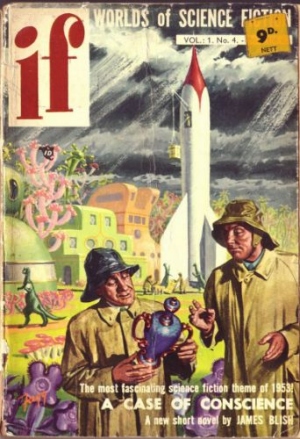Birthday Reviews: James McKimmey, Jr.’s “Planet of Dreams”

James McKimmey, Jr. was born on September 5, 1923 and died on January 19, 2011.
Although McKimmey wrote several science fiction short stories between 1952, when “Tergiversation” appeared in The Avalonian and 1968 when “The Inspector” was published in The Farthest Reaches, the majority of his fiction, including all seventeen of his novels, were in the crime fiction genre. In addition for his writing, he is known for an eleven year correspondence he conducted with Philip K. Dick between 1953 and 1964.
“Planet of Dreams” first appeared in the September 1953 issue of If, edited by James L. Quinn. LibriVox included the story in their 2010 audio anthology Short Science Fiction Collection 042.
Daniel Loveral’s ideal utopian society is to live on a planet in which nobody has to work, their every need from food and water to clothing and tools provided for by machines and their world. To achieve this, Loveral has led a group of immigrants to Dream Planet and instituted the society of his promise. Ironically, Loveral is required to work constantly to ensure that his followers can live in the world he promised them.
When word reaches Loveral that one of his followers, George Atkinson, is working, Loveral goes to discuss the situation with him. If anyone (other than Loveral) works in their utopian world, Loveral sees it as an admission of failure. Furthermore, if Atkinson makes something that only he has, Loveral is afraid that jealousy will also rears its head and cause the society to fail.
Unfortunately, Atkinson has very different views. While Loveral is busy with a project to make sure the society as a whole is what he pictured, he isn’t paying attention to their actual current wants and needs. Atkinson, like so many of the other inhabitants of the planet, are finding that the utopian world which they signed on is a boring place that doesn’t challenge them or give them any real raison e’dtre. Rather than being able to enjoy themselves, they can only focus on how bored they are.
It becomes apparent that although Altkinson appears to be acting alone, he is a representative for all of the citizens. McKimmey portrays Atkinson’s solution as one that is supported by everyone and the only real solution to the problem, however both McKimmey and, apparently, Atkinson seem to have ignored other potential paths towards the goal of revisiting the utopia’s charter and providing the sense of purpose people need, which ultimately weakens the story.